The New Adventures Of Joel Kim Booster
Joel Kim Booster is a nuanced, incisive comedian who makes his effort onstage look seamless. And, also, those abs!
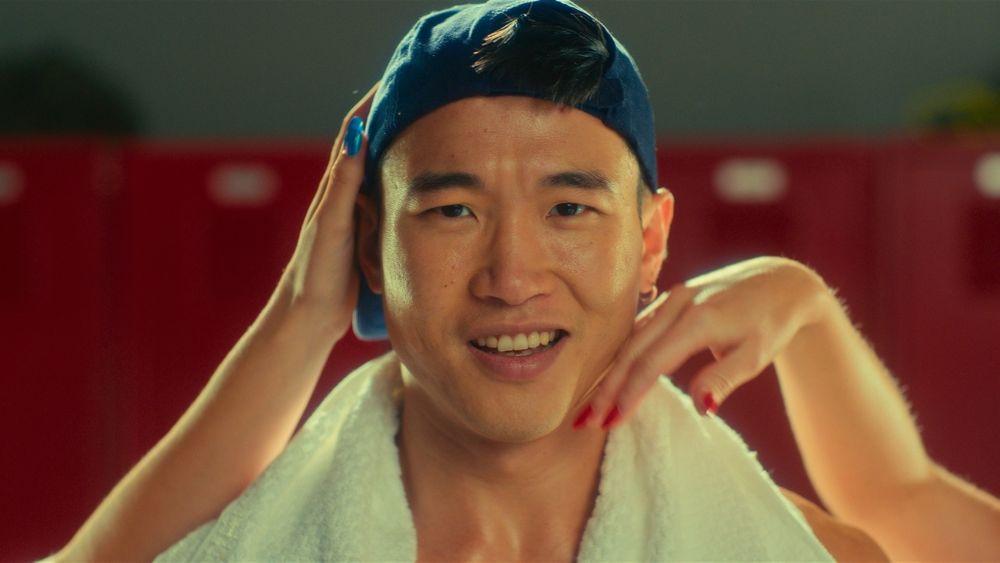
Joel Kim Booster is now a household name for his endearing portrayal of Nicholas on Loot. The role is a refreshing switch up from the ‘gay best friend’ stereotype, and in season two of the AppleTV+ sitcom, is as much his own person as the trusted sidekick to Maya Rudolph’s Molly. Season two explores Nicholas’ relationship with his parents. Poignant in its understatement, and universally relatable, the arc runs parallel to Booster’s own conservative upbringing.
Adopted as a baby from Korea by white evangelical parents, he was homeschooled until he was 16. He has an elder brother and sister, biological children of their parents. After they found out his sexual orientation by reading his journal, things became fraught. Yet somewhere in that childhood, to paraphrase Julie Andrews, there must’ve been something good. A lot, in fact. Today, Booster offers unique perspectives on race and gender politics, broadening the scope of Asian representation in entertainment.
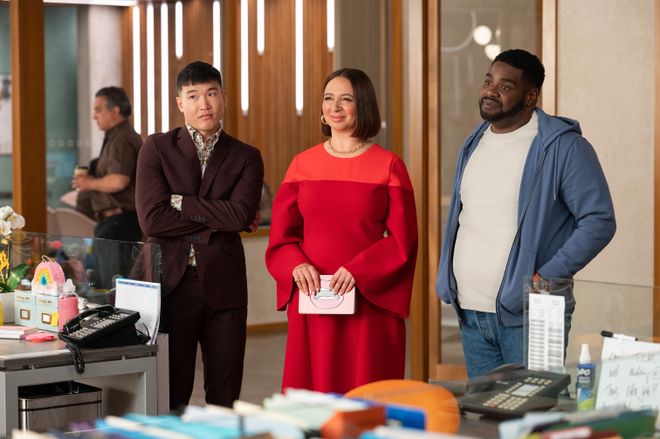
Joel Kim Booster, Maya Rudolph, and Ron Funches in the sitcom Loot.
On his way up to full-fledged stardom, he pulled the Batman/Bruce Wayne double shift; by day a copywriter, and by night performing stand-up in Chicago. By 2014, he had moved to New York, appearing on Conan, Comedy Central Stand-Up Presents, and writing for Billy on the Street, Big Mouth and The Other Two, before releasing his side-splitting album, Model Minority. Numerous appearances on late-night TV followed, culminating in his Netflix special Psychosexual, which confronts the painful-funny aspects of the modern Asian American experience.
Then came Fire Island, Searchlight Pictures’ 2022 rom-com that he wrote and starred in. Transposing themes from Jane Austen’s novel Pride And Prejudice into a different setting, he explored modern dynamics of class, identity and race. That year, he was named an ‘emerging advocate and creative’ in the TIME100 Next 2022, and a Variety Screenwriter to Watch. By 2023, Fire Island won the GLAAD Media Awards for Outstanding Film — Streaming or TV; and picked up two Emmy nominations in 2023 for Outstanding Writing for a Limited or Anthology Series or Movie, as well as Outstanding Television Movie.
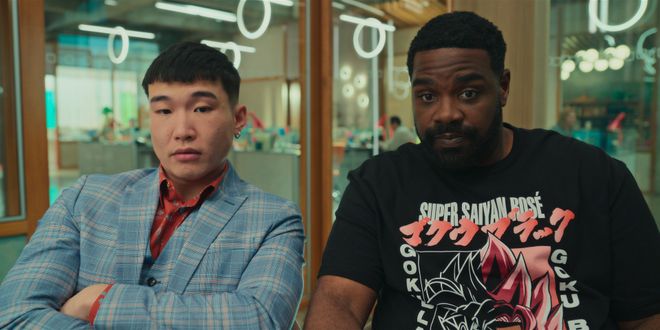
Joel Kim Booster and Ron Funches in Loot.
Related article: Apple TV Debuts New Digital Fashion Network
Now based in Los Angeles, the 36-year-old hosts celebrity dinners with model Chrissy Teigen and celebrity chef Dave Chang on Chrissy & Dave Dine Out. He’s also been a judge on RuPaul’s Drag Race (the ‘Corporate Queen’ episode). Just back in Los Angeles from the Melbourne International Comedy Festival in Australia, he opens up about dealing with haters, colourism, and his personal style choices.
Nicholas spends a lot of time in Molly’s closet on Loot. Is there anything that you would make off with? If no one was watching?
I would definitely abscond with some Jimmy Choos, and then sell that for a neat little profit and then probably buy myself, I don’t know, some Christian Cowan!
What are your favourite fashion trends at the moment?
My vibe has always been very streetwear. I’ve attempted to dress like a skater since I was like 13, even though I’ve basically never been on a skateboard. I’m really into the ’90s — baggy shorts, wrap tops, and flannel. Like sort of mixing eras is a lot of fun. Pattern mixing, tasteful clashing, and a little bit of skin where it’s appropriate.
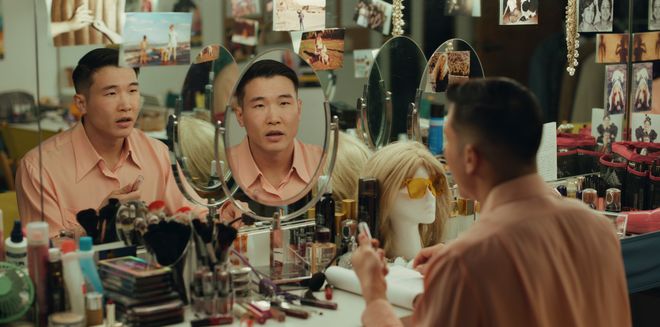
Joel Kim Booster in Loot.
In Loot, you’re the fashion police, and you lay down the law. How much fun was that aspect of your character?
I definitely think it’s fun. I mean, it’s definitely in line with who I am as a person. I think Nicholas just voices it more; I keep it mostly internal or maybe shared with my partner. But I have a lot of judgement about what a lot of people are wearing these days. I just don’t choose to share it as much as Nicholas does.
Related article: These Iconic ‘90s Supermodels Get Their Own Docuseries on Apple TV+
What sort of stories would you like to tell in this part of the world, versus the kinds of stories that you would gravitate to in the West?
Oh, God, I’ve never even thought about that, I don’t know that there would be a difference. Everything is so hyper-specific now, and we have a freedom to be hyper-specific, and get really granular with the stories that we’re telling, especially as it relates to representing a specific group or identity. For me, I just want to continue to tell stories that are deeply personal and deep, and hyper-specific to my experience, and hope people not only are able to see themselves in those stories. Also, people who don’t necessarily relate to them at all, but are still able to engage with them.
Especially as people of colour in the West, or queer people in the West, I think we’re really used to watching media and finding a way in… we’ve been trained from the time we were very young to be able to watch a show like Friends, which obviously didn’t represent me on any level, racially, sexually, economically, any of that, but I was still able to find ways in to relate to that show. People who are in the majority don’t ever have to do that, and I think asking them to do that work, and watch stories that are maybe about communities they are not a part of, and having to do that exercise of finding their own way in, it would be really edifying for a lot of people.
How do you access narratives that were not necessarily written for you?
I think you will find a way in which people who are ‘other’ find a way. … I think the majority will always find ways to discriminate, and separate themselves and sort themselves internally. When I met some guys from Korea on a cruise, they chastised me for letting myself get too dark. That is something I had never experienced as an Asian American, but then I remembered, oh, in Korea, we are the majority, then of course, colourism comes into play. Because when we’re the majority, we have to find those ways to sort ourselves into tiers. That’s something that’s not often discussed about Asian culture in the West, because here, we’re just Asian. People don’t necessarily think about the shades of Asian that we are, and certainly, it’s not something we’re concerned about in the West. We are in the minority here already, so it doesn’t matter. If you’re a light-skinned Asian or a dark-skinned Asian, you are Asian, and so will be treated as an Asian. Whereas in Korea, where everyone is ethnically Korean, you sort yourselves by shade and colour. It’s an interesting conundrum.
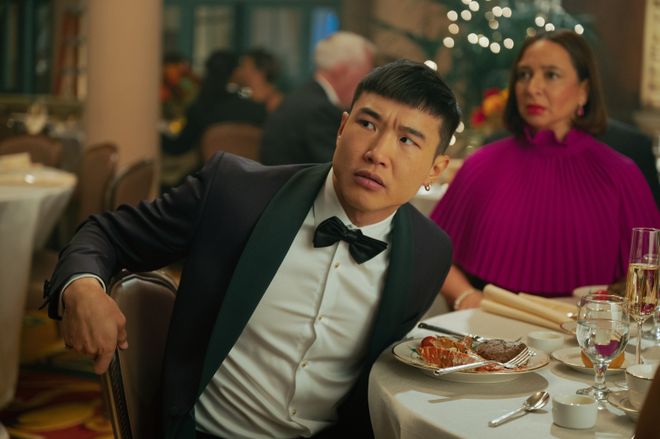
Joel Kim Booster and Maya Rudolph in Loot.
On a more personal note, what’s a typical day like for you? Is it everything you wished for?
The thing that makes it everything I wished for is there is no such thing as a typical day for me anymore. Since the day I left my nine-to-five, every day has been so different. And I think that the structure and the discipline that I developed over the time when I was coming up, working a day job and then doing comedy at night, really prepared me for this moment. There are many days where I’m not shooting, I don’t have a show. I don’t have any meetings… it’s just me and my keyboard. So I wake up, and it really is up to me to structure my day, and make sure I don’t just sit around and watch TV all day. Every day is different, and it is really about the self-discipline it takes to make those days count; how much time goes into self-care, how much time goes into creative pursuits. I always, always, always try to give myself at least an hour for the gym, four to five times a week. I prefer to start my day that way. So whether that is at 10am on a day where I don’t have a lot going on or at 5am on a day I’m shooting all day, I always set the intention to get to the gym, as my first big activity of the day.
When did that start?
Around 2015, 2016 is when I really got into fitness. I moved into my apartment, which was next to a gym, and it was only $25 a month. So for the first time in my life, it was no longer a convenience issue. And it was no longer a financial issue. So I was able to really pour myself into it. Especially in those early days, before I’d quit my day job when my life was really turbulent, and my career was really turbulent, fitness always felt like something I could control. It has always felt like something that grounds me a little bit. Everything else is sort of out of my hands—the one thing I can take charge of is my own personal health and physical fitness. So it’s been a huge part of my life for the last 10 years.
When you’re so into so many things, how does that discipline flow into how you prioritise your projects?
I have a pretty detailed sort of spreadsheet—an immediate list of tasks that needs to be handled. What is something that I can get out of the way now, or can be handled later. It’s just about being able to quickly and efficiently prioritise tasks. And I think that is the skill that I’ve built up over the last 13 to 14 years doing this.
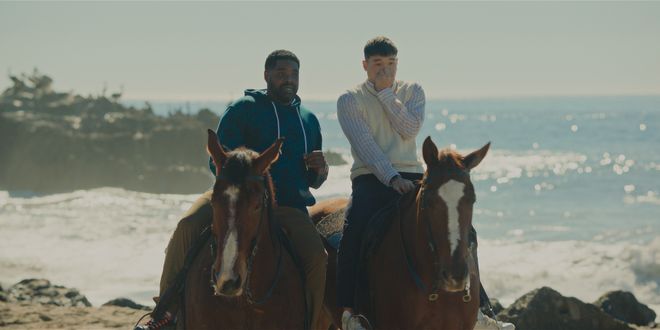
Ron Funches and Joel Kim Booster in Loot.
What, in your opinion, is the hardest part about the front-facing aspects of what you do, like acting compared to writing, where actually, nobody really cares how you look?
For me, it is the onslaught of opinions about who I am as a person from strangers online, I think, you know, no one person was ever really meant to have that much access to criticism and opinions about themselves. There are a lot of people online who love to tell me who I am with very little context, and that is something that really does rattle me. And it’s very tough to read some of the things that people say about me based on very little information or context. You have to really learn to let it go because there is no controlling that narrative sometimes, as much as you might want to try. You can’t. I think part of the reason I started doing stand-up is the desire to be seen, and to be known. As much as that continues to be a need and a want of mine, I’ve slowly realised that people will never see me fully. You know, they’re just not able to piece together all the various bits of context that I’ve thrown out there in my work into a coherent image of who I actually am.
Anybody who’s in your position is extremely brave, I have the easier job asking questions. What is the secret for managing that pressure internally?
Oh, therapy is a big part of it. And surrounding myself with people, with a great support system, I think my partner and my friends are all people who remind me of who I really am when I’m faced with a lot of pressure. I think unplugging is another big thing. You have to figure out really quickly whose opinion matters and whose voice you have to listen to. And it’s not always easy to figure that out. But I think that is like the biggest priority for a lot of people as they’re starting to gain attention.
Serene Goh is a guest writer for Harper’s BAZAAR Singapore and founder/director of Brango, a content solutions company. Contact her at brango.com.sg.